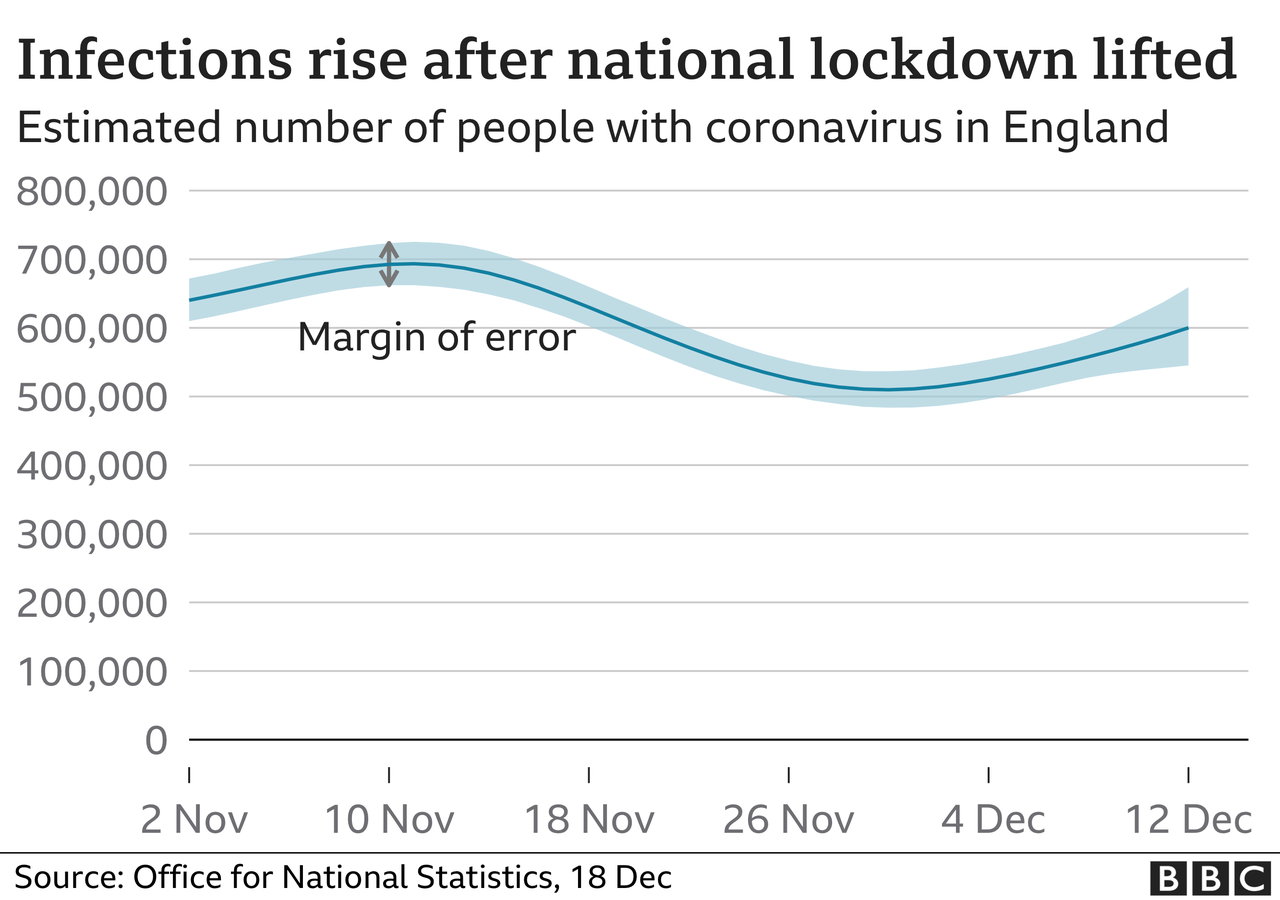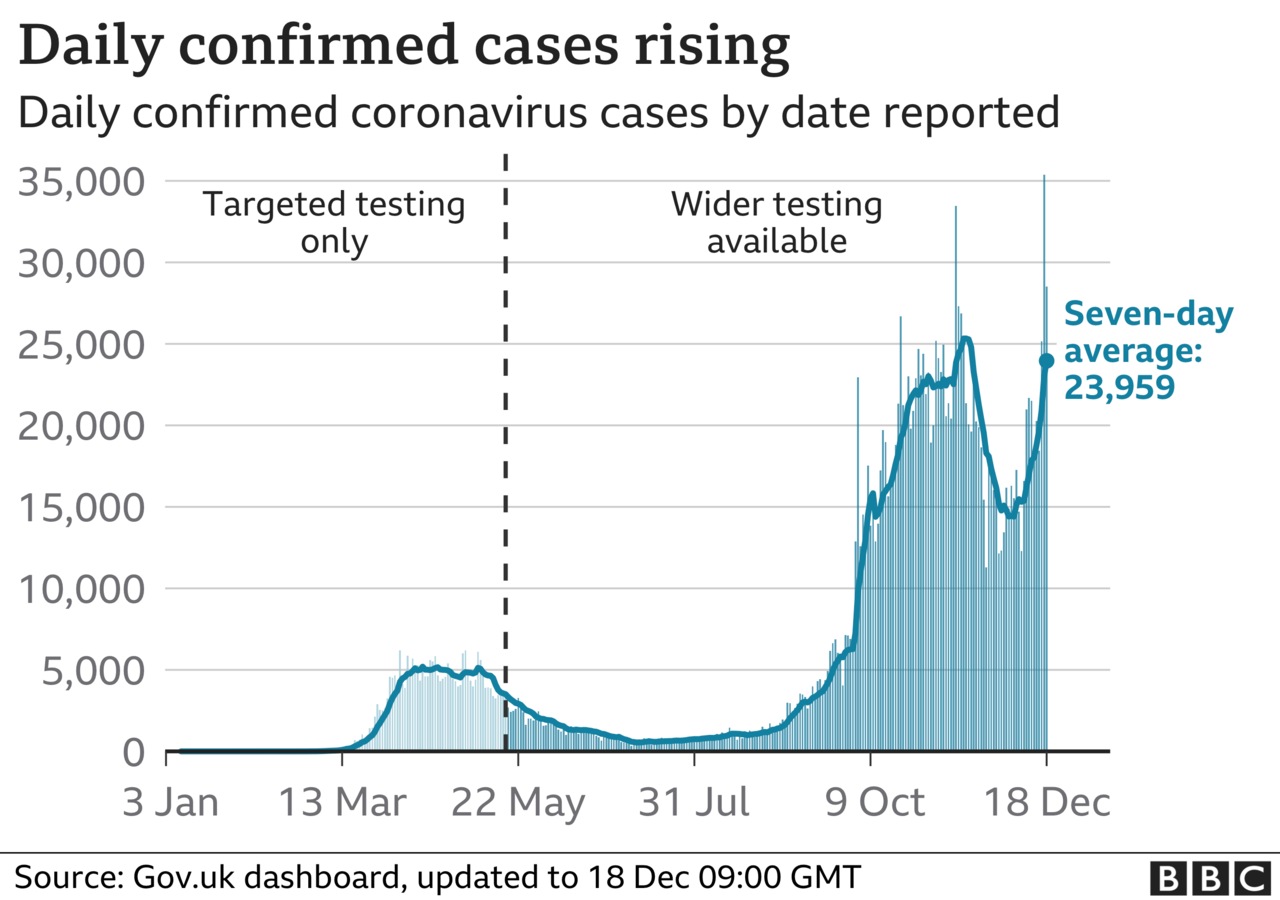
Covid: Boris Johnson 'hoping to avoid' national lockdown
He chaired meetings on Friday, No 10 sources said, amid "growing concerns" about the spread of a new variant of Covid in south-east England.
Health bosses have warned the NHS is already under significant pressure.
Nearly 90% of hospital beds in England are full, with coronavirus adding to normal winter demands.
Government scientists are continuing to evaluate the new strain and ministers have been discussing what action will be necessary to deal with this, sources said.
Asked if people were going to be told to re-think their Christmas plans, a Downing Street source said: "We are not there yet."
A separate government source suggested that travel restrictions were discussed, but it is not clear that they have been signed off.
On Monday Health Secretary Matt Hancock said the variant may be associated with the faster transmission of the virus in the South East but there was "nothing to suggest" it caused worse disease or that vaccines would no longer work.
Meanwhile, the R number - which represents how many people each infected person passes the virus onto - has risen above 1 in the UK.
The latest figure, calculated by the government's scientific advisers, is estimated to be between 1.1 and 1.2, up from between 0.9 and 1 last week.
The UK recorded a further 28,507 cases on Friday, along with 489 deaths within 28 days of a positive test.
Official figures show Covid-19 cases have risen in the past week in England, driven by sharp increases in London, as well as rises in the South East and East Midlands.
The president of the Royal College of Emergency Medicine, Dr Katherine Henderson, said England and Scotland needed to do "whatever it takes" to get a grip of the virus, even if that meant "full lockdown".
Asked whether England would end up following Northern Ireland and Wales into lockdown, Mr Johnson said: "Obviously we are hoping very much that we'll be able to avoid anything like that, but the reality is that the rates of infection have increased in the last few weeks."
He said the Christmas rules, which are being relaxed across the UK between 23 and 27 December, were "very much a maximum" and "not a target people should aim for".
The prime minister encouraged people to "think about our elderly relatives" to "avoid spreading the disease" over Christmas.
He added that he hoped next year, with the rollout of the vaccine, would "be very different indeed".
Earlier, he tweeted a message warning people planning to form "Christmas bubbles" in the UK to start minimising contact with people from outside their households from today.
Labour leader Sir Keir Starmer said "nobody wants a third lockdown" but England's tiered system was "not strong enough".
He called for the prime minister to "toughen up over Christmas", saying the Welsh government's decision to limit Christmas bubbles to two households, instead of three, was a "step in the right direction".

Prof Neil Ferguson, whose team's modelling led to the original lockdown in March, said he was "more concerned" about what the country was going to be facing in early January than over the Christmas period itself.
The epidemiologist from Imperial College London told BBC Radio 4's World at One programme that very rapid increases in case numbers had left "very little headroom", adding that any future lockdown in England may have to be tougher than the one seen in November.
Meanwhile, teaching unions have criticised the government's announcement that the return to secondary school in January will be staggered to allow schools to set up a Covid testing scheme.
They say the move came too late for them to make the necessary preparations for testing. But Nick Gibb, the schools minister, has defended the plan, saying the government would provide support.

It comes after a tough new six-week lockdown was announced in Northern Ireland from 26 December.
Health Minister Robin Swann said the measures were essentially a return to March's sustained restrictions, with non-essential shops and close-contact services such as hair salons having to close.
Pubs, cafes and restaurants will be restricted to takeaway services.
The first week of the restrictions, running until 2 January, will see even tighter measures with essential shops, including supermarkets, having to close each day by 20:00 GMT.
No sporting events will be permitted at all - even at elite level - with people being urged only to leave their home for essential reasons.
In Wales, non-essential shops will close from the end of trading on Christmas Eve, with an alert level four lockdown starting four days later.
In England, some 38 million people will be subject to the nation's strictest measures - tier three - from Saturday.
Scotland's Health Secretary Jeane Freeman said the option for a post-Christmas lockdown in Scotland "remains on the table".
'Significant pressure'
Meanwhile, documents released by the government's Scientific Advisory Group for Emergencies (Sage) say avoiding social contacts for more than five days before meeting older or vulnerable people at Christmas will reduce the risk of transmitting the virus.
A longer period - of a week or more - would reduce the risk even further. A document dated 26 November says taking a rapid coronavirus test before a multi-day gathering inside a home could also reduce the risk.
Sage says mixing between households over the festive period for one or two days would be less risky than multiple households spending the entire time together.
But the documents warn there may be a higher proportion of cases in more vulnerable age groups during the festive period, which could lead to an increase in hospital admissions.
The decision by all four UK nations to relax restrictions and allow more mixing for five days over Christmas has prompted concern that it will fuel a further surge in case numbers.
Average NHS bed occupancy in England has reached almost 89% for the week ending 13 December, with 59 out of 126 NHS trusts reporting bed occupancy of higher than 90% - which is above the recommended safe level.
Dr Katherine Henderson told BBC News the UK was at a "really dangerous point where we could tip into finding it incredibly difficult to manage" and her colleagues were "increasingly" seeing ambulances queuing outside hospitals.
In Northern Ireland, Dr Martin Kelly, a consultant respiratory physician in Londonderry, told BBC Radio 4's Today programme: "Right in the mouth of Christmas we're seeing a significant further surge in numbers which is already putting the service under significant pressure."
And Dr Nick Lyons, a health board medical director in south Wales, said things were similar in his region, where non-urgent procedures have been cancelled.
The intensive care units "were basically full with Covid patients" while the area's field hospital was "roughly at half its total capacity", he told Today.










